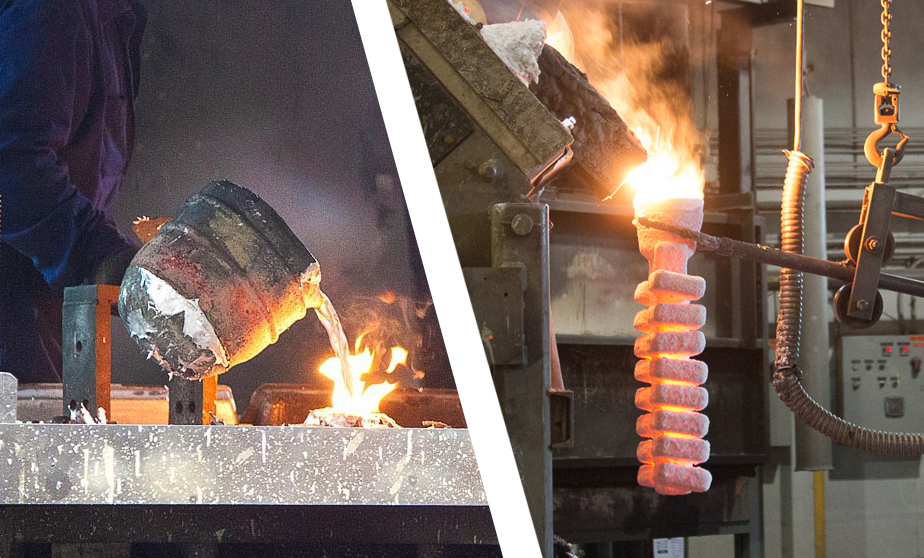The 25-Second Trick For Stahl Specialty Company
The 25-Second Trick For Stahl Specialty Company
Blog Article
10 Simple Techniques For Stahl Specialty Company
Table of ContentsNot known Factual Statements About Stahl Specialty Company Fascination About Stahl Specialty CompanyOur Stahl Specialty Company PDFsAbout Stahl Specialty CompanyStahl Specialty Company - An Overview
Chemical Contrast of Cast Aluminum Alloys Silicon promotes castability by reducing the alloy's melting temperature and improving fluidness during casting. In addition, silicon adds to the alloy's toughness and wear resistance, making it valuable in applications where longevity is important, such as automotive components and engine components.It additionally enhances the machinability of the alloy, making it less complicated to refine into ended up products. This way, iron adds to the general workability of light weight aluminum alloys. Copper enhances electrical conductivity, making it advantageous in electrical applications. It additionally boosts corrosion resistance and includes to the alloy's overall stamina.
Manganese adds to the toughness of aluminum alloys and improves workability. It is commonly made use of in functioned light weight aluminum items like sheets, extrusions, and accounts. The visibility of manganese aids in the alloy's formability and resistance to breaking during manufacture procedures. Magnesium is a light-weight element that gives toughness and impact resistance to light weight aluminum alloys.
It permits the production of light-weight parts with outstanding mechanical buildings. Zinc boosts the castability of light weight aluminum alloys and aids control the solidification procedure during casting. It enhances the alloy's stamina and hardness. It is usually discovered in applications where elaborate forms and fine information are essential, such as decorative spreadings and specific vehicle components.
The 7-Minute Rule for Stahl Specialty Company
Due to the fact that aluminum-silicon alloys have great spreading homes, high gas properties, basic procedures, and outstanding deterioration resistance, aluminum-silicon alloys are most typically made use of in the die-casting industry in the house and abroad. At the same time, aluminum-silicon alloys are additionally relatively very early and widely identified alloys created and used in die-casting. After continuous research and improvement, many of the current global mainstream aluminum-silicon alloys have been settled and are absolutely nothing more than A356, A360, A380, ADC12, B390, and A413.
The key thermal conductivity, tensile toughness, return stamina, and elongation differ. Select suitable resources according to the efficiency of the target product generated. Amongst the above alloys, A356 has the highest thermal conductivity, and A380 and ADC12 have the lowest. The tensile limitation is the contrary. A360 has the very best return strength and the greatest elongation rate.

How Stahl Specialty Company can Save You Time, Stress, and Money.
In precision spreading, 6063 is fit for applications where elaborate geometries and top notch surface coatings are extremely important. Examples consist of telecommunication units, where the alloy's remarkable formability permits smooth and aesthetically pleasing designs while keeping structural integrity. In a similar way, in the Lighting Solutions sector, precision-cast 6063 elements create stylish and efficient lights components that call for detailed shapes and good thermal efficiency.
(https://justpaste.it/ibbjd)
It brings about a better surface area coating and better corrosion resistance in A360. Furthermore, the A360 displays exceptional prolongation, making it suitable for complicated and thin-walled components. In accuracy casting applications, A360 is fit for markets such as Consumer Electronic Devices, Telecommunication, and Power Devices. Casting Foundry. Its boosted fluidness enables for elaborate, high-precision components like mobile phone cases and interaction device housings.

In precision casting, light weight aluminum 413 beams in the Consumer Electronics and Power Devices industries. This alloy's remarkable deterioration resistance makes it a superb choice for exterior applications, ensuring resilient, resilient items in the stated markets.
The 20-Second Trick For Stahl Specialty Company
Once you have made a decision that the light weight aluminum die casting process appropriates for your task, a vital following step is deciding on the most appropriate alloy. The light weight aluminum alloy you choose will significantly impact both the spreading procedure and the residential or commercial properties of the final item. Because of this, you need to make your choice very carefully and take an informed approach.
Establishing one of the most appropriate aluminum alloy for your application will certainly suggest evaluating a broad selection of attributes. These comparative alloy features adhere to the North American Die Spreading Organization's standards, and we've separated them right into 2 classifications. Casting Foundry. The initial category addresses alloy characteristics that influence the manufacturing process. The second covers attributes influencing the residential properties of the last product.
The alloy you choose for die casting directly influences a number of elements of the casting process, like exactly how easy the alloy is to collaborate with and if it is susceptible to casting flaws. Hot cracking, additionally called solidification splitting, is a regular die casting flaw for light weight aluminum alloys that can cause inner or surface-level rips or splits.
Fascination About Stahl Specialty Company
Certain aluminum alloys are much more prone to warm cracking than others, and your selection should consider this. One more usual problem located in the die casting of aluminum is die soldering, which is when the actors stays with the die walls and makes ejection difficult. It can damage both the cast and the die, so you need to seek alloys with high anti-soldering visit this page buildings.
Corrosion resistance, which is currently a remarkable quality of aluminum, can vary significantly from alloy to alloy and is an important particular to think about depending upon the environmental conditions your product will be revealed to. Wear resistance is an additional residential or commercial property commonly sought in aluminum items and can set apart some alloys.
Report this page